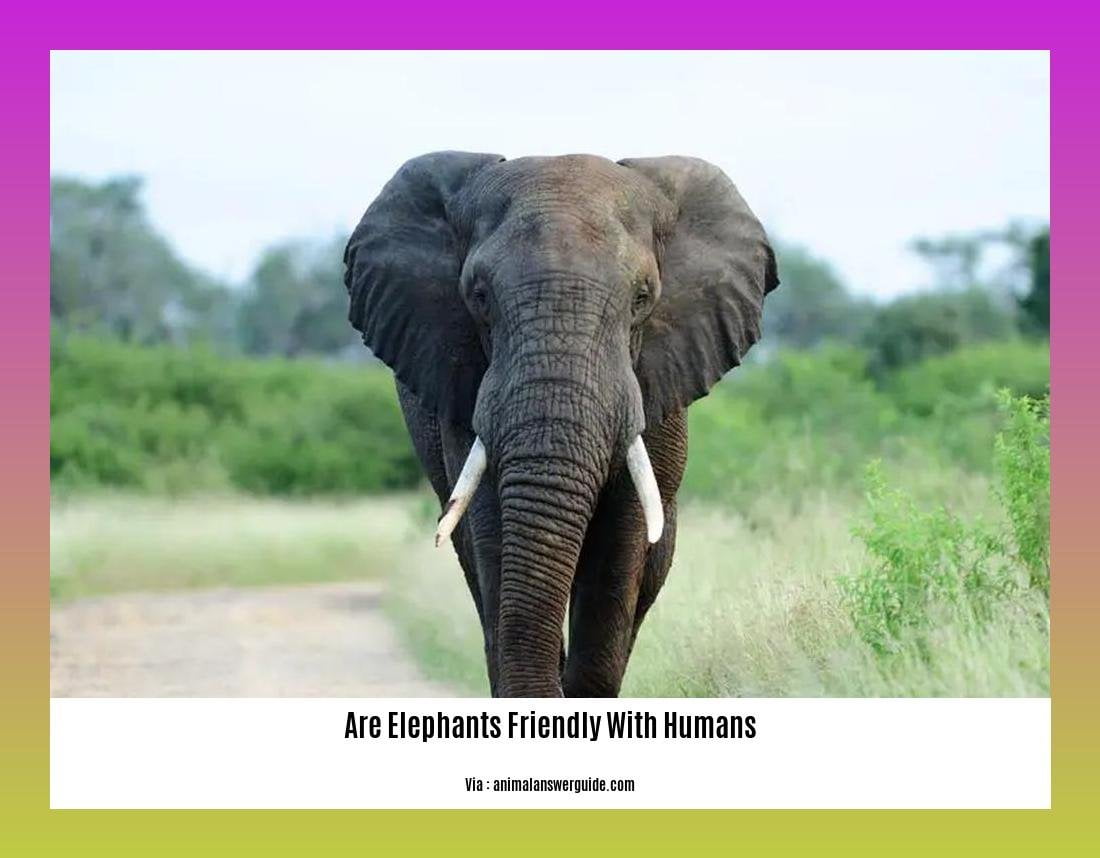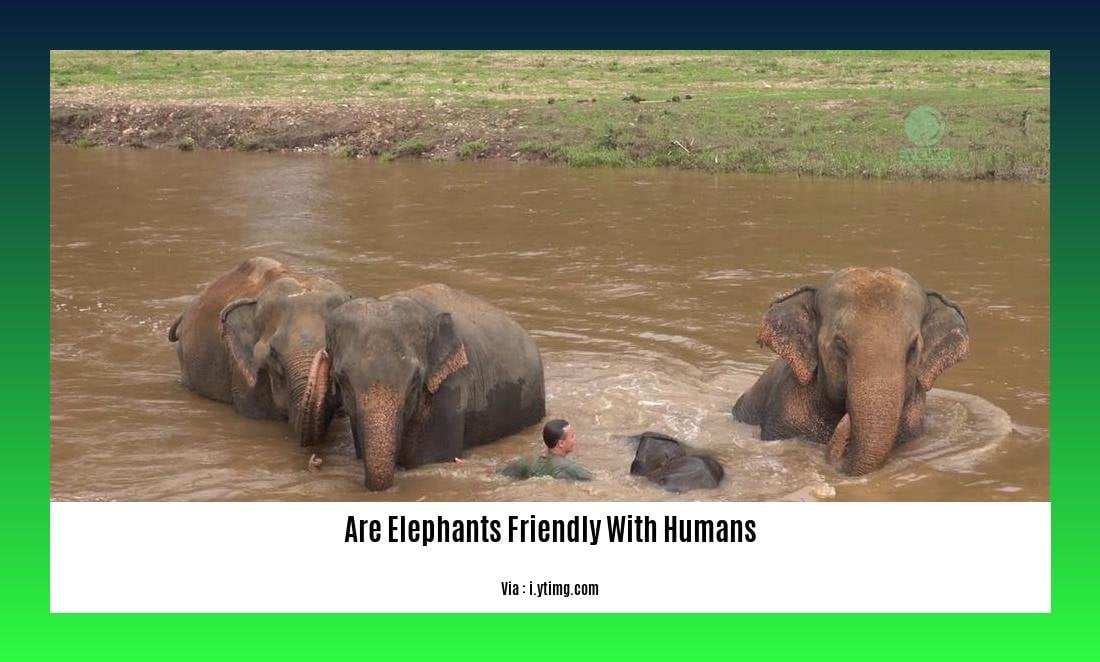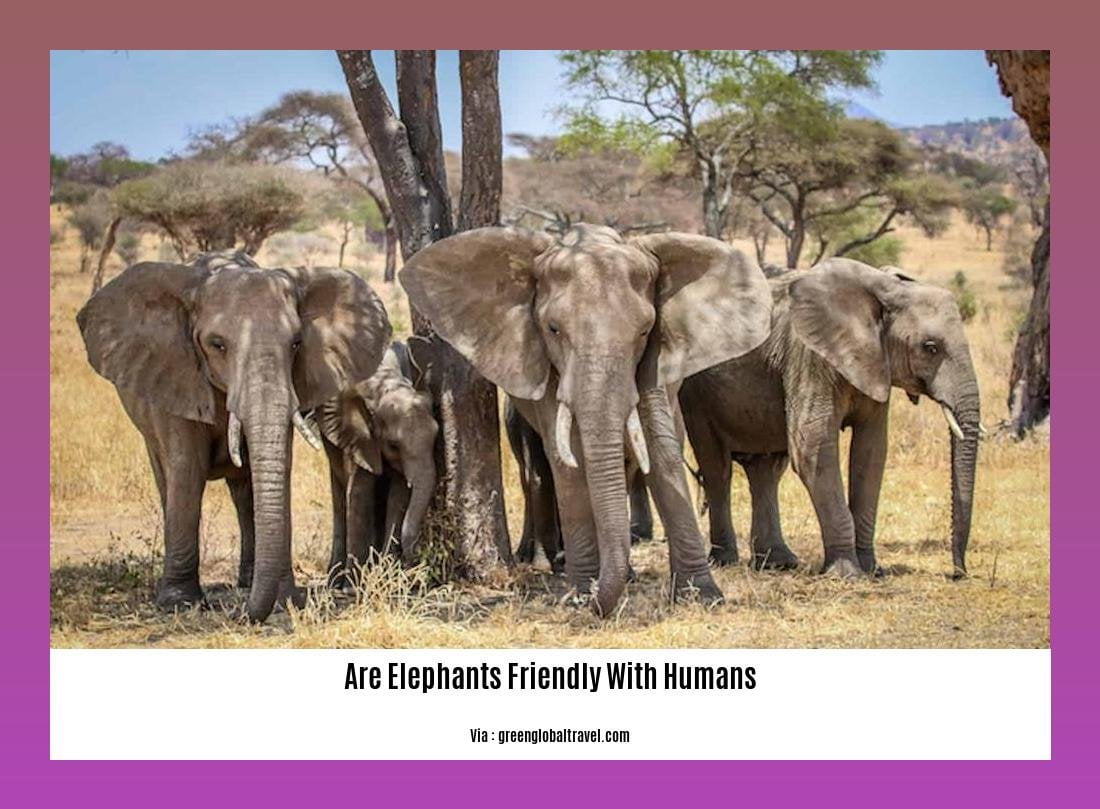Have you ever wondered if elephants and humans can be pals? Let’s jump into their wild interactions and see how these gentle giants connect with us. We’ll uncover their friendly gestures, the way they talk to each other, and even the hiccups they face in this thrilling interspecies adventure.

Are Elephants Friendly with Humans?
Elephants are amazing creatures that have fascinated humans for centuries. But are they friendly towards us? Let’s dive into the world of elephants and explore their relationship with humans.
Understanding Elephant Friendliness
Just like people, elephants can have different personalities and attitudes towards humans. Some factors that affect their friendliness include:
- Early Encounters: Elephants that grow up around humans are more likely to be comfortable with our presence.
- Positive Interactions: Elephants that have positive experiences with humans, like being treated with kindness and respect, tend to develop bonds with us.
- Negative Experiences: Elephants that have been mistreated or injured by humans may become fearful or even aggressive.
Elephants as Loyal Companions
When elephants are raised with humans and given the opportunity to develop relationships, they can become incredibly loyal companions. Like dogs, they can learn to trust and rely on us, and they may even protect us if they feel threatened.
Helping Hands
Elephants are not just friendly; they can also be incredibly helpful. Throughout history, elephants have been used to help humans in various ways, including:
- Transporting heavy objects
- Providing support in combat
- Assisting in search and rescue operations
Living in Harmony with Elephants
If you ever find yourself in a situation where you encounter elephants, it’s important to remember a few things:
- Give them space: Elephants are large animals that need plenty of room. Don’t approach them too closely or try to touch them.
- Respect their herds: Elephants live in social groups called herds. Avoid disrupting their herds or getting between family members.
- Be mindful of your actions: Your body language and behavior can affect how elephants perceive you. Act calmly and avoid making sudden movements.
Conclusion
So, are elephants friendly with humans? Yes, they can be. When elephants are treated with respect and given the opportunity to build relationships, they can become remarkable companions and allies. By understanding their behavior and needs, we can foster harmonious relationships with these gentle giants and appreciate their unique friendship and assistance.
- Are elephants friendly to other animals? Find out here: are elephants friendly to other animals
- Interested in learning about elephants’ behavior towards humans? Discover more about are elephants friendly towards humans in this informative article.
- Are you curious about whether elephants are nice animals? Read all about it in our comprehensive guide: are elephants nice animals.
How Can Humans and Elephants Coexist Peacefully?
Imagine the towering presence of an elephant, its gentle nature etched upon its massive frame. But what happens when these majestic creatures cross paths with human communities? Coexistence can be challenging, but it’s not impossible. Here’s how humans and elephants can live side by side in harmony:
Respect and Communication
Elephants are like us – they need their space. Avoid getting too close or being aggressive. Instead, listen and observe their behavior. If they trumpet or flap their ears, it’s time to back off and give them their space.
Nature’s Guardians: Crop Protection
Elephants love to munch on crops, but we can’t let them raid our food sources. Instead, let’s try using natural deterrents like beehive fences, chili hedges, or thorny shrubs. These barriers keep elephants at bay without causing them harm and protect our precious harvests.
Herding Wisdom
Elephants have wise old matriarchs who lead the herd with a keen sense of danger. They know where to avoid humans and potential conflicts. By respecting their guidance and understanding their herd behavior, we can guide them away from our homes and fields.
A Tribal Tradition of Respect
Some tribal communities have lived alongside elephants for centuries, developing a deep understanding and respect for these gentle giants. They see elephants as “other than human persons” and follow a code of conduct that minimizes disturbance. This wisdom can teach us to coexist harmoniously with nature.
Key Points to Remember:
- Give elephants space and avoid any actions that might make them feel threatened.
- Learn to interpret their signals and respect their need for distance.
- Create sustainable barriers to protect crops without harming elephants.
- Respect the guidance of experienced matriarchs who guide their herds.
- Learn from the wisdom of traditional communities that have lived in harmony with elephants.
Remember, coexistence is about finding balance. By respecting elephants, understanding their behavior, and using innovative solutions, we can create a world where humans and elephants thrive together.

Are Elephants Friendly in Captivity?
Unveiling the Elephant’s Inner Circle
When it comes to elephants, their size and imposing presence can make them seem intimidating. But don’t let their appearance fool you! Elephants are surprisingly social and intelligent creatures, capable of forming close bonds with humans.
Factors Shaping Elephant Friendliness
Just like our furry friends, elephants are influenced by their surroundings and experiences. Here’s what plays a crucial role in their friendliness towards humans:
Early Upbringing: Elephants that grow up in close contact with humans, whether they’re raised alongside them or in captivity, tend to develop a positive view of people. They associate humans with comfort, safety, and care, making them more likely to be friendly and trusting.
Human Interaction: The frequency and nature of human interaction significantly impact an elephant’s friendliness. Elephants that have regular and positive interactions, such as feeding, grooming, and training, are more comfortable being around people. This interaction helps them understand and trust human intentions.
Positive Experiences: Elephants can form deep bonds with humans in areas where they have a mutually beneficial relationship. In Southeast Asia, for instance, elephants have a long history of working alongside humans in various roles, including transportation, logging, and even combat. Through these experiences, elephants have learned to appreciate and rely on human companionship.
Similarities to Dogs Elephants share some striking similarities with our beloved dogs. They’re highly trainable, eager to please, and capable of forming strong emotional attachments to individuals. This shared characteristic makes elephants surprisingly approachable and responsive to human care and affection.
Table: Elephant Friendliness Factors
| Factor | Influence on Friendliness |
|---|---|
| Early Upbringing | Positive relationships with humans |
| Human Interaction | Frequency and positivity |
| Positive Experiences | Collaboration and mutual respect |
| Trainability and Bond Formation | Similarities to dogs |
Conclusion
Elephants are not just gentle giants; they can also be friendly and approachable. Their friendliness is nurtured through positive early experiences, regular human interaction, and a shared history of collaboration. Understanding the factors that shape elephant friendliness helps us appreciate their remarkable capacity for companionship and bond-forming.
How to Avoid Elephant Aggression: A Comprehensive Guide
Elephants, those magnificent giants, often enchant us with their gentle nature. However, being wild animals, they may react aggressively if they feel threatened. Understanding their behavior is key to harmonious encounters, but avoiding aggression is crucial. Here’s a comprehensive guide to keep you safe:
Understanding Elephant Behavior:
Like humans, elephants have complex social structures and communication methods. Observing their body language can help gauge their mood. Here’s a quick guide:
| Body Language | State |
|---|---|
| Ears spread, trunk down, relaxed body | Relaxed |
| Ears partially spread, trunk raised, head moving | Alert |
| Ears flapping, trunk swinging, swaying head | Agitated |
| Ears pinned back, trunk curled, charging posture | Aggressive |
Respecting Elephant Territories:
Human activities often encroach upon elephant habitats, causing potential conflicts. Elephants view disturbances in their environment as threats. Staying away from known elephant roaming areas minimizes the likelihood of confrontations.
Avoiding Confrontations:
If you encounter an elephant, stay calm and avoid sudden movements. They can get startled quickly and may charge if they feel cornered. Give them plenty of space and retreat slowly, keeping an eye on their behavior. In the unfortunate event of an aggressive encounter, run in a zigzag pattern, making it harder for the elephant to pursue.
Key Tips:
- Keep a safe distance and observe elephant body language.
- Avoid areas where elephants are known to roam.
- If you encounter an elephant, remain calm and move away slowly.
Run in a zigzag pattern if the elephant charges.
FAQ
Q1: Are wild elephants typically friendly towards humans?
A1: Wild elephants are not inherently friendly towards humans. They are primarily concerned with the well-being of their herd and may charge if they feel threatened.
Q2: Can elephants become friendly with humans?
A2: Yes, elephants in captivity can be trained to interact with humans and may become friendly and helpful towards them. Additionally, elephants raised in areas with human presence may become more amiable.
Q3: What factors influence elephant behavior towards humans?
A3: Elephants’ interactions with humans are shaped by their experiences. Elephants raised alongside humans develop stronger bonds and are more friendly, while poor living conditions and lack of human interaction can make them less receptive.
Q4: How can humans avoid conflicts with elephants?
A4: Understanding elephant behaviors and respecting their territories is crucial to minimizing human-elephant conflicts. Additionally, communities living near elephant habitats have developed unwritten codes of conduct, such as giving elephants space and using natural barriers to safeguard crops.
Q5: What is the role of matriarchs in elephant-human interactions?
A5: Matriarchs play a vital role in guiding elephant herds and ensuring their well-being. Their experience and leadership help herds avoid areas with potential human presence, thus minimizing conflicts.
- Sept 31 Myth: Unveiling Calendar Secrets - March 18, 2025
- How Long & Till December 18, 2025: Accurate Countdown Guide - March 18, 2025
- Discover Japanese Artists: A Complete History - March 18, 2025
















